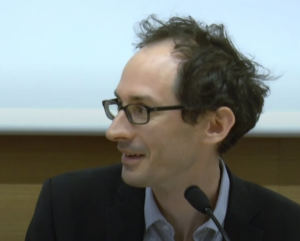Via Zoom – RSVP Here
The Quello Center 2024-2025 speaking series is co-hosted by the Information Policy Workshop and presents works-in-progress on topics covered by the Information Policy Book Series of The MIT Press. The series is co-organized by Sandra Braman and Keith Hampton. Proposals for presentations (and for books!) are welcome; please contact Sandra at bramansa@msu.edu if you are interested.
All talks will be recorded and will be available to those who have registered. For a copy of the recording, please reach out to Ashley Wilson at wils1620@msu.edu
In the wake of the end of the USSR, the Russian Internet initially developed freely, leaving the initiative to numerous actors inventing digital tools adapted to their uses. However, since the beginning of the 2010s, the authoritarian turn of the Russian state has led to the deployment of a network of controls and constraints which has tightened both on the actors and on the country’s digital infrastructures. While the network of networks has long carried hopes of democratization of the Russian public sphere, its framework was built up gradually, through controversies and trials. Despite criticism and circumvention by activists and citizens, digital oppression has contributed to political sovereignization and of a warmongering dynamic, the culmination of which was the invasion of Ukraine in February 2022.
This talk introduces our upcoming book “Digital Authoritarianism in the Making” (MIT Press, forthcoming 2025; first published in a French-language edition in 2023). The book draws an overview of coercive governance and emancipatory digital uses in Russia, from peace to war. It focuses on the multiple digital actors and objects at the heart of political controversies and usage tensions in the Russian digital space in the 2010s. It shows the processes of construction of digital oppression, as well as critiques, conflicts and circumventions which bring together public and private actors, both supporters of the internet order and defenders of its freedoms. Through the lens of the Russian case, this book questions contemporary digital reconfigurations, from surveillance to sovereignty.
 Françoise Daucé is Professor at the EHESS (School for Advanced Studies in the Social Sciences in Paris), member and former director of the CERCEC laboratory (Center for Studies of the Russian, Caucasian and Central European Worlds).
Françoise Daucé is Professor at the EHESS (School for Advanced Studies in the Social Sciences in Paris), member and former director of the CERCEC laboratory (Center for Studies of the Russian, Caucasian and Central European Worlds).
 Benjamin Loveluck is Junior Professor at the Paris-Panthéon-Assas University, member of the CERSA laboratory (Center for Studies and Research in Administrative and Political Sciences)
Benjamin Loveluck is Junior Professor at the Paris-Panthéon-Assas University, member of the CERSA laboratory (Center for Studies and Research in Administrative and Political Sciences)
 Francesca Musiani is Associate Research Professor at the French National Research Council (CNRS), member and deputy director of the CIS laboratory (Centre for Internet and Society).
Francesca Musiani is Associate Research Professor at the French National Research Council (CNRS), member and deputy director of the CIS laboratory (Centre for Internet and Society).


